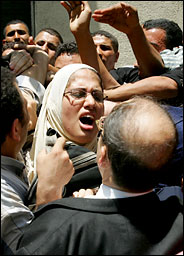The Libyan parliament in Tobruk rejected the formation of a national unity government as part of a UN-backed plan to resolve the political crisis in Libya, following a vote on Monday.
Eighty-nine members, out of 104 attending the session, voted against supporting the government suggested by the Libyan presidential council based in Tunisia, and asked for a new government suggestion in 10 days.
Since 2014, Libya has witnessed a conflict between two parliaments and two governments. Each of them is supported by several militias on the ground.
The West aims to form a unified government, in an attempt to solve the political crisis, in order to fight the “Islamic State” (IS) militant group in the oil-rich country.
Tobruk parliament MPs told local media that they rejected the suggested government because it contains too many ministers, which is financially unsustainable while Libya is going through an economic crisis.
Despite refusing the suggested government, the Tobruk parliament did vote in favour of the UN-backed agreement for a new unified government.
They objected to only one article of this agreement, which allows the new government to appoint military leaders.
The UN envoy to Libya, Martin Kobler welcomed their decision to accept the agreement. “I welcome the endorsement of the Libyan Political Agreement by the House of Representatives today,” Kobler said on his Twitter account.
Kobler urged both the Presidential Council and the House of Representatives to take the necessary actions as soon as possible.
Meanwhile, unidentified forces fired at least four rockets at two camps for internally displaced people in Benghazi on 9 January, Human Rights Watch (HRW) said in a statement released on Sunday. Two witnesses told HRW that three rockets struck the Red Crescent camp, killing three civilians and injuring seven others, including two children.
“Firing rockets into displaced persons’ camps with no military present shows an utter disregard for civilian lives,” deputy Middle East director at HRW, Joe Stork said. “Armed forces and militias need to do their utmost to protect civilians and ensure they are out of harm’s way.”
“The current conflict raging in Benghazi, in eastern Libya since July 2014 has displaced thousands of residents as a result of indiscriminate attacks on residential areas, killing civilians and damaging hospitals and other buildings, particularly in the downtown area,” the HRW statement read.
“All parties in the armed conflict in Libya are required to abide by the laws of war. Serious violations of this code, when committed with criminal intent, are war crimes. Those who commit, order, assist, or have command responsibility for war crimes are subject to prosecution by domestic courts or the International Criminal Court (ICC).”
Meanwhile, senior US officials said the US and its allies are increasing reconnaissance flights and are collecting intelligence in Libya in preparation for possible airstrikes and commando raids against the “Islamic State” (IS).
“It’s fair to say that we’re looking to take decisive military action against IS, in conjunction with the political process,” chairman of the Joint Chiefs of Staff, General Joseph Dunford said Friday to US media. “The president has made it clear that we have the authority to use military force.”
Libya has witnessed a major lapse in security since the ouster of former leader Muamar Gaddafi in 2011.General Dunford said the US, France, Italy and the UK are concerned about the growing power of IS in Libya, hoping to contain the group before it spreads throughout North Africa.
He stressed on the importance of “putting a firewall” between IS in Libya and other militant Islamist extremist groups on the African continent, while working to strengthen the ability of African governments to fight those groups themselves.


